MARCH 2, 2009 — My friend Suzanne and I were driving through the pastoral countryside of rural New England on a deserted highway when we passed a serial killer at 70 miles per hour, leering at us from a truck. Or at least, Suzanne thought he was a serial killer.
“I just saw the scary guy from Deliverance leering at me from that truck cab!” Suzanne exclaimed. Trying to keep my eyes on the road, I didn’t see him, and I’m always skeptical of Suzanne’s ability to understand the world of flirting. I curtly shot back, “I’m sure he wasn’t leering at you. You really don’t understand the interaction between the sexes.”
But before Suzanne had time to convince me otherwise, the truck driver passed our passenger window again, and this time, I got a good look at him. I gasped. The terrifying sight of this truck driver peering at me through his window made me feel instantly uneasy. I saw a hulking man with an abnormally large, bowling ball-shaped face baring an insane smirk and two enormous front buckteeth. He looked like a maniacal chipmunk whose only joy in life was serial murder. Against the cab’s window, he ominously looked directly into our eyes as he held a cell phone against the glass. We were sure that he planned to use the phone to suck out our souls, or even worse, take photographs of us and post them on his evil serial killer blog.
Suzanne and I had embarked on a Henry David Thoreau-inspired vacation. To escape the urban sprawl of Los Angeles with its gridlocked roads, smoggy air, and ubiquitous plastic surgery, we had jumped on a plane to Boston to flee to Thoreau’s beloved rustic northeast. In honor of our muse, on the plane, I began reading Walden — Thoreau’s seminal work about simplifying life — a book which he wrote while living in the Massachusetts forest near Walden Pond. Thoreau wrote a lot about how materialism can drive men mad, much of which seems even more relevant today than it was in his time. He also wrote about solitude and the way living alone in the wilderness can change a person. Was the behavior of this crazy looking truck driver what Thoreau meant when he wrote his famous line, “The mass of men lead lives of quiet desperation”? Why had this character from Deliverance chosen to single us out? Were the woods of New England driving him crazy? And what were his true intentions with that cell phone?
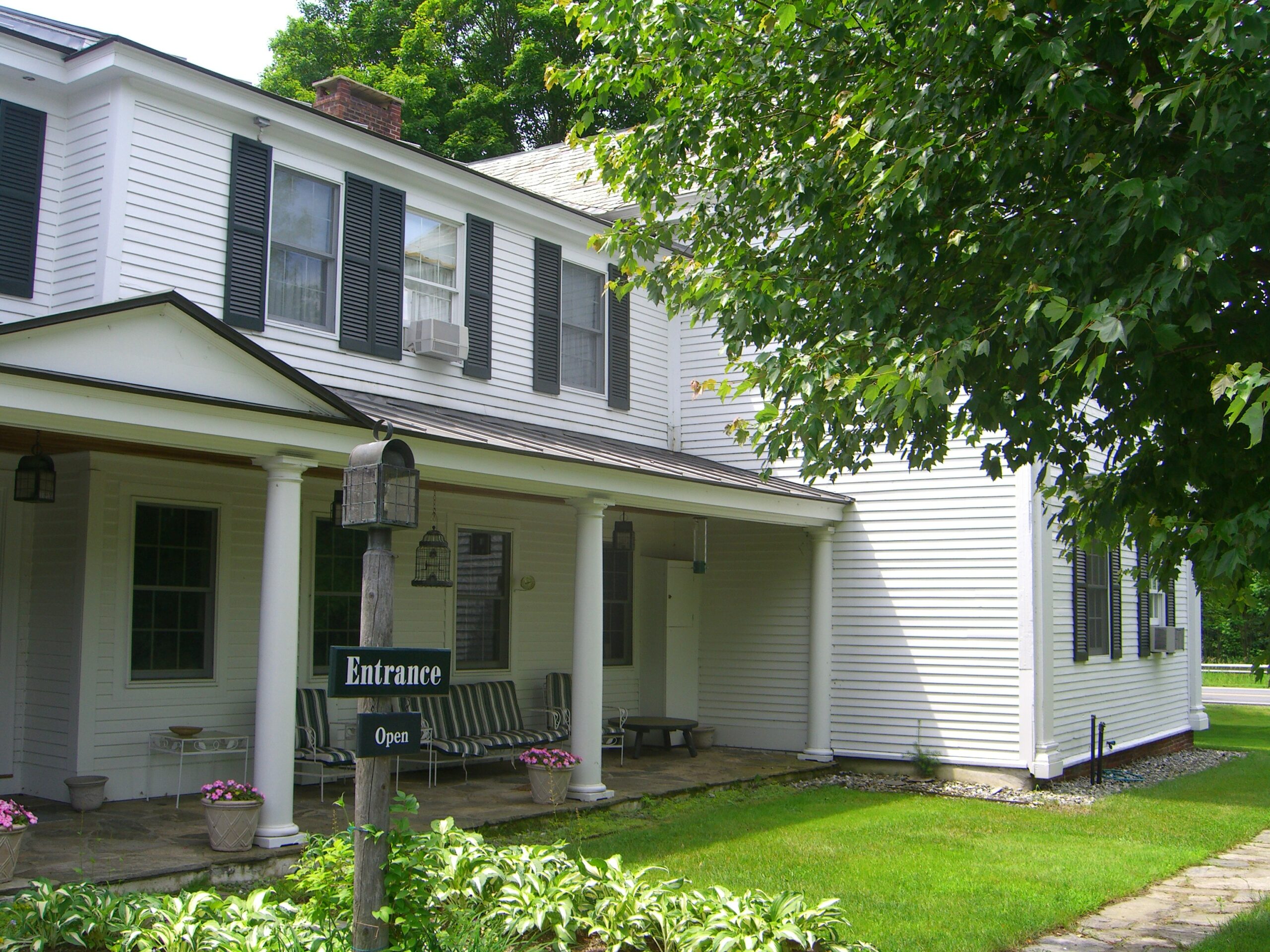
The Chase House is a bed and breakfast in Cornish, New Hampshire.
I jammed down on the accelerator, and we escaped quickly, never looking back, as we continued onward toward a cabin we had reserved near New Hampshire’s White Mountain National Forest. After a quick stop at the photogenic Cornish-Windsor Bridge — touted as the longest two-span wooden covered bridge in the world, a somewhat dubious honor — we arrived at our quaint lodging. We found our “cabin” to be a bit more luxurious than Thoreau’s — the owners made us breakfast and insisted that Suzanne and I make reservations immediately for a marriage in an adjacent gazebo — but the spirit of our trip, to relax in the woods far from civilization, remained intact.
After unpacking, we rented a canoe and prepared for a paddle on the nearby Connecticut River in an attempt to reenact Thoreau’s boat trips out onto Walden Pond. We set out on the river, paddling slowly with the current, drifting quietly through emerald eel grass, passing chalk-colored birch trees on the banks. We watched loons and spotted sandpipers dive carelessly in the water, their songs echoing far down the river. Thoreau wrote of the entrancing rhythm of the rise and fall of the loons on Walden Pond, and Suzanne and I quickly began to understand. For hours, we watched the birds rise and fall, rise and fall, darting playfully on the surface of the water, all the while unknowingly serving us as nature’s television. Thoreau wondered “what beside safety [the birds] got by sailing in the middle of Walden,” and he suspected that a simple love for the water drove their boundless energy. Dusk fell as we listened to the soothing night sounds of the Connecticut, and I felt certain that Thoreau was right — who wouldn’t jump at the chance to spend a life flying freely over the Connecticut?
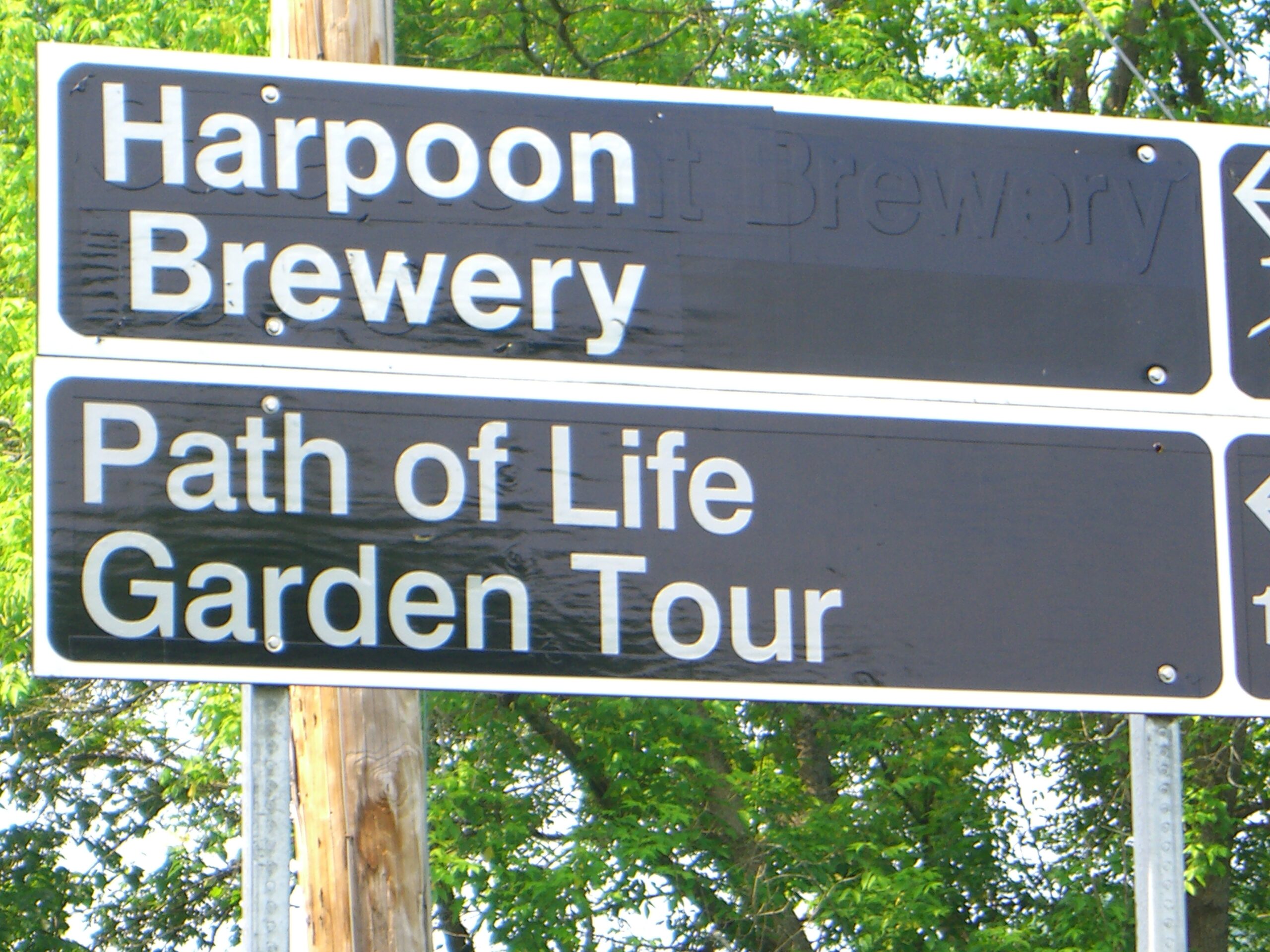
A road sign in Windsor, Vermont advertises a “Path of Life” Garden Tour.
As we relaxed in our cabin that night, enjoying our isolation in the woods, Suzanne and I discussed the next stop of our trip. Contrary to popular impression, Thoreau’s life in the woods wasn’t truly solitary. He visited a nearby town frequently to see friends at a tavern, visit a barber, and retrieve supplies at the grocery. Our vacation in the woods was to include a trip to our rural New Hampshire alma mater for a college reunion to see old friends.
On a recent hiking trip, my brother and I joked that simply applying a specific brand of sunscreen containing a unique artificial banana scent caused a rush of childhood memories to bubble to the surface of our consciousness: “I’m remembering my first kiss! The first time I hit a baseball! My first steps!”
I knew that stepping back onto our college campus would be like applying the sunscreen, bringing a waterfall of memories, both good and bad. I was nervous. After all, I preferred that some memories, like my breakup with my first college girlfriend, the murder of two beloved college professors during my senior year, and the terrifying newly-formed memories of the Chipmunk Serial Killer, stay repressed in the dark corners of my mind for eternity. We fell asleep, lulled by the sounds of the forest, but uneasy about our re-entry into civilization.
The next day, after waking and eating breakfast, Suzanne and I hopped into our car and drove toward the school. When we arrived on campus, I walked across the enormous lawn in front of the blindingly white library’s clock tower. Again, I was swamped by memories. I felt the warmth of the spring sun as I studied on the prickly green grass. I smelled the clean scent of pine trees as I hiked through New Hampshire’s White Mountain National Forest after graduation. I felt the spray of rushing water as I kayaked through Vermont before the start of my freshman year. I heard the sound of ringing telephones as I spent hours writing in the college newspaper’s offices. I tasted the oatmeal my roommate cooked for dinner in our cramped one-room dorm room. I shivered as I kissed my girlfriend for the first time in the falling snow next to the hockey pond.
I can’t swear to it, but I think I smelled banana sunscreen too. It smelled good, and the Chipmunk Serial Killer was nowhere to be found.
When I woke up, my teeth were gone
Reluctantly growing up and visiting Walden Pond.
MARCH 10, 2009 — I am probably the only person in the world stupid enough to have had an oral surgeon remove my wisdom teeth five days before going to his five-year college reunion. I had been putting off this rite of passage for years because of the infamous “Wisdom Teeth Choice.” Oral surgeons let patients choose whether they want to be put asleep completely during surgery or kept awake with pain numbed by local anesthesia. I was sure I wanted neither. The only thing I could imagine scarier than having an hour of my life erased from my memory — e-mail-based urban legends have made me protective of my kidneys — was being fully awake as a surgeon ripped out my teeth. More importantly, wisdom teeth removal would be my last major tooth-related life milestone before dentures. The surgery seemed like a big step — too big. But when my dentist threatened me before the reunion with forecasts of imminent mouth destruction (or, at least, imminent crooked teeth), I panicked and scheduled the first available appointment. When I woke up, my teeth were gone.
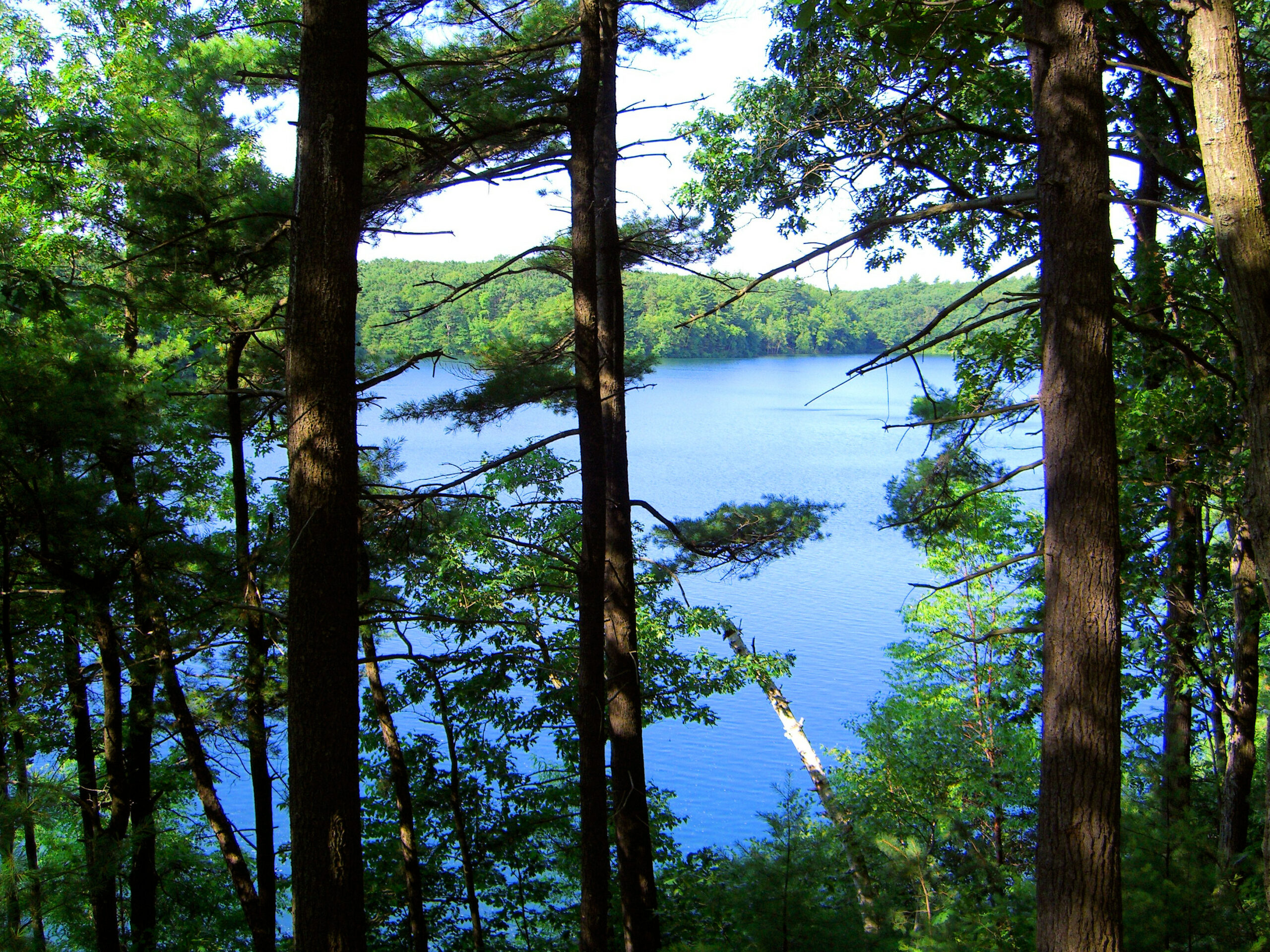
Walden Pond, in Concord, Massachusetts, is the location where Henry David Thoreau wrote his most famous work.
As if living out a bizarre version of James Frey’s A Million Little Pieces, I met my friend Suzanne for our trip four teeth lighter, toting a month’s supply of medical-strength Ibuprofen and Hydrocodone. (Of course, Frey’s drug history is significantly more sordid than mine, and my story also happens to be true.) I confessed to Suzanne that I had spent the previous week eating only cottage cheese and drinking Starbucks Crème Frappuccinos. She chuckled, and confessed that, in a strange coincidence, she had recently sprained her ankle very badly practicing karate — Suzanne is a quirky girl of many talents — and she too was taking prescribed painkillers between physical-therapy sessions.
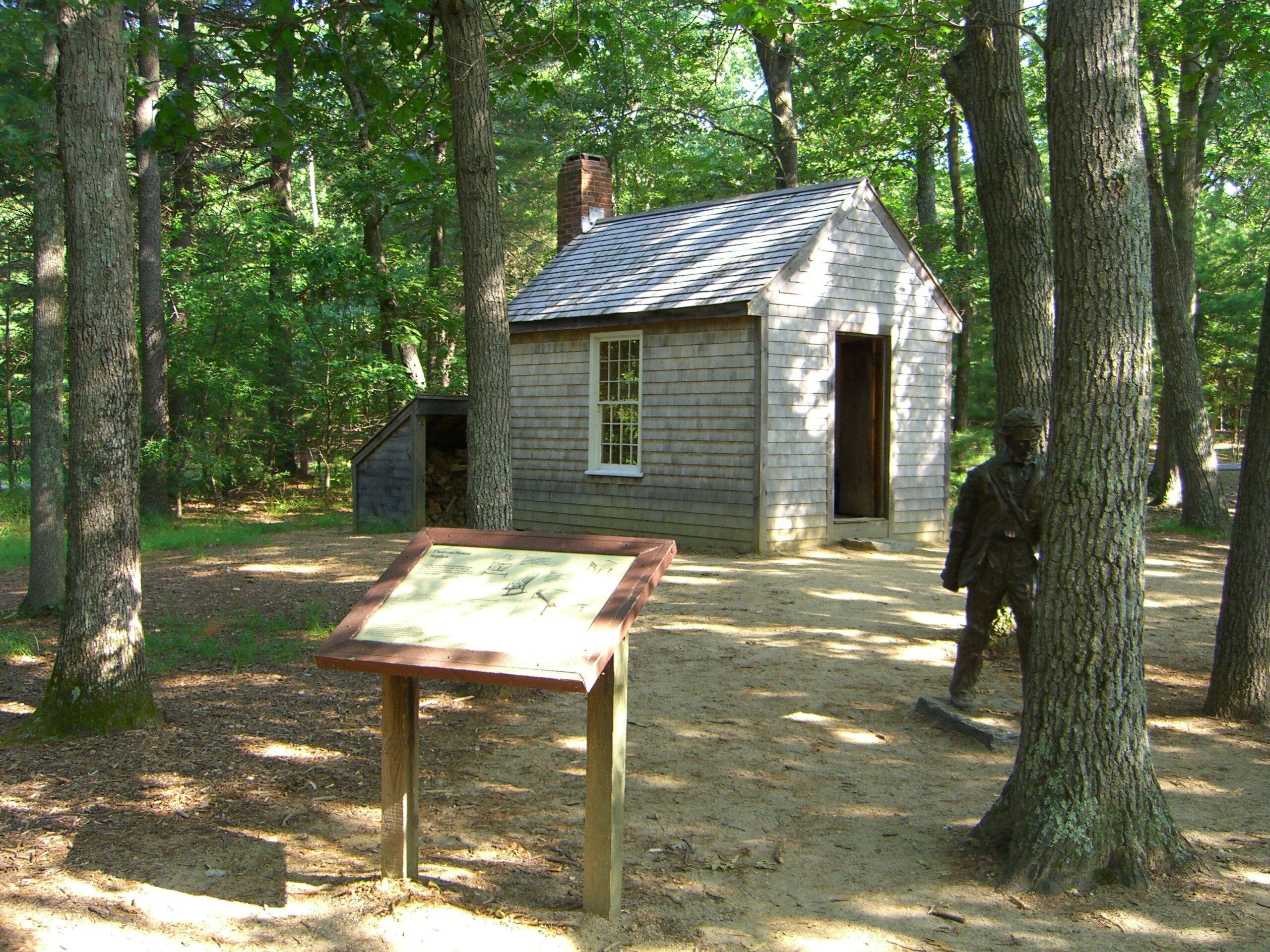
A replica of Thoreau’s cabin stands near Walden Pond.
And so, we hobbled into our five-year college reunion together, complaining like two crotchety senior citizens who had been married for sixty years. I searched around for soft foods that wouldn’t hurt my teeth. Whenever Suzanne needed to walk down a flight of stairs, it took ten minutes. I tried to speak without actually opening my mouth, in an effort to avoid jaw pain. Suzanne found a single location to stand and tried to never move. All the while, we popped painkillers. We were a pathetic duo.
Yet despite our elderly appearance, we were a bit worried that, compared to our adult classmates, we were more like children. It’s true that Suzanne had recently graduated from Harvard Law School and was pursuing a screenwriting career. Meanwhile, I was pursuing a career at a large technology company. But we weren’t sure these pursuits were our passions, and we weren’t close to getting married or having kids. Suzanne was still eating ice cream by the pint, and I was still singing about “staying eighteen forever” at rock concerts filled with teenagers.
In this state of conflict, we toured the reunion in physical pain and emotional confusion, speaking to a seemingly unending supply of newly minted lawyers. Apparently, a lot of our classmates had attended law school because they didn’t have any other ideas about what to do after college. Unfortunately, most of them seemed to be miserable with their actual work.
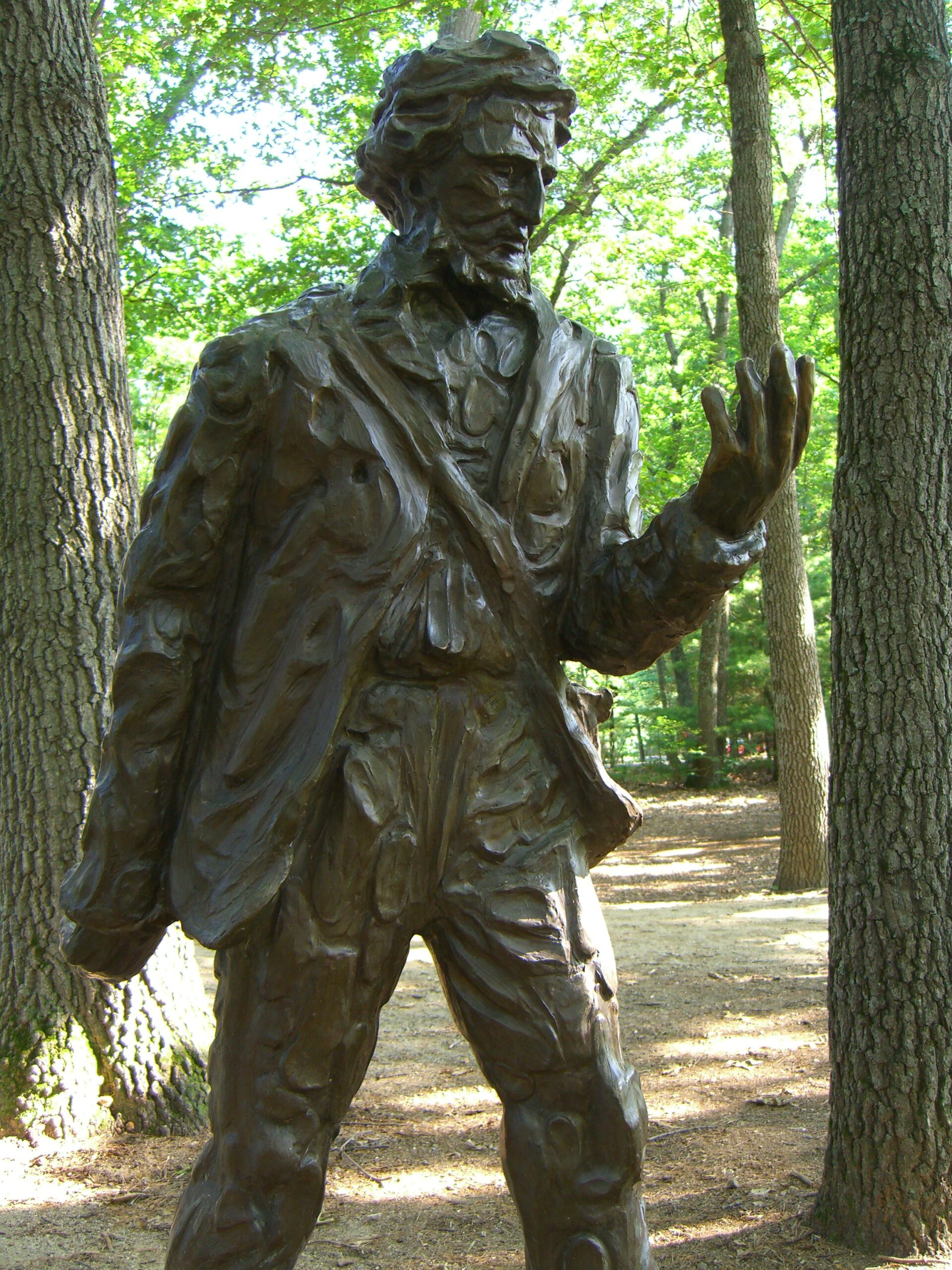
A statue of Henry David Thoreau stands near Walden Pond.
I couldn’t help hearing Thoreau’s voice in my head: “Most men… through mere ignorance and mistake, are so occupied with the factitious cares and superfluously coarse labors of life that its finer fruits cannot be plucked by them.” Of course, there’s nothing wrong with becoming a lawyer — or any other profession — if it’s a goal that really sounds fun or interesting. But it’s easy, as we grow into adults, to get distracted by the things we feel we’re supposed to do — land a high-paying job, get married, buy cars and houses, for example. We forget or fear consequences too much to pursue our desires or even discover them.
To their credit, a few of our classmates seemed to have heeded Thoreau’s warnings. We met Dominic, an engineer who talked giddily about his work with underwater robotics. My friend Connie’s career in microfinance became more interesting when she explained her passion for bringing financial information to places that capitalism seemed to have forgotten. My old friend Michelle had joined the Peace Corps and moved to Africa after graduation. Despite the palpable uncertainty in the air, it was comforting to know that some of our peers were on life paths and were married to people that they genuinely loved.
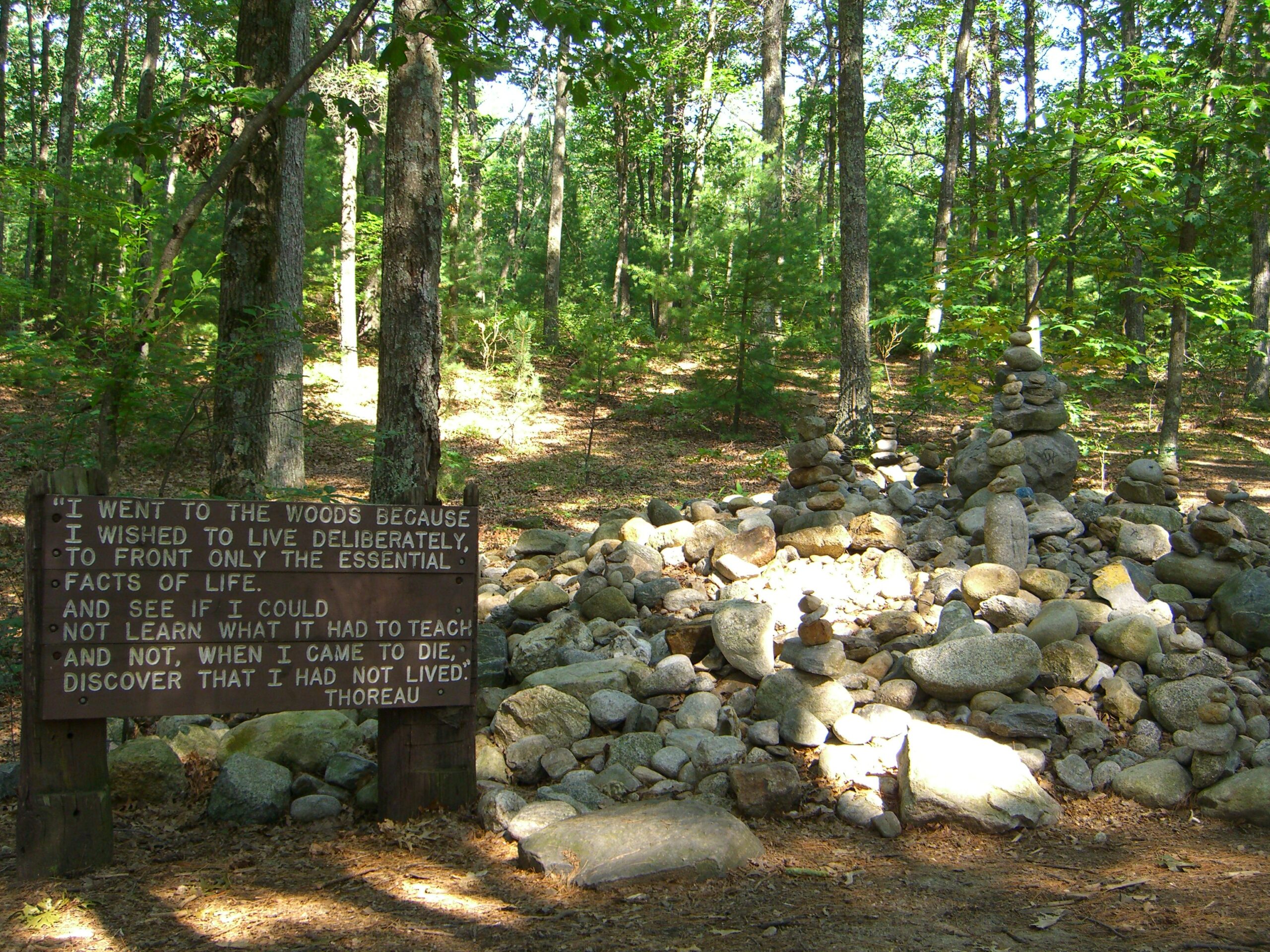
A sign serving as a tribute to Thoreau stands in the forest near Walden Pond.
After a banquet on the reunion’s second night, a drunken girl grabbed a microphone and embarrassed herself as she drunkenly toasted to the days she spent in her sorority, describing her every-night binge drinking. Almost on cue, a drunken guy slipped and shattered a wine bottle when he accidentally nudged it off a stone ledge during her speech.
As I hopelessly attempted to chew the prime rib and Suzanne massaged her ankle while finishing her pie, we watched their childish antics with contempt. I realized that she and I might actually be starting to grow up. Sure, we existed in a grey area behind childhood and adulthood, pursuing goals we weren’t sure about — but we had definitely gone beyond the stage of slurred toasts and drunken teenage bashes. At the very least, we hadn’t turned into maniacal truckers prone to tormenting other drivers.
“If you have built castles in the air, your work need not be lost; that is where they should be. Now put the foundations under them,” Thoreau wrote. Suzanne and I certainly had some castles; we just needed to get started their foundations — if only we knew how to build them. Maybe Thoreau could help.
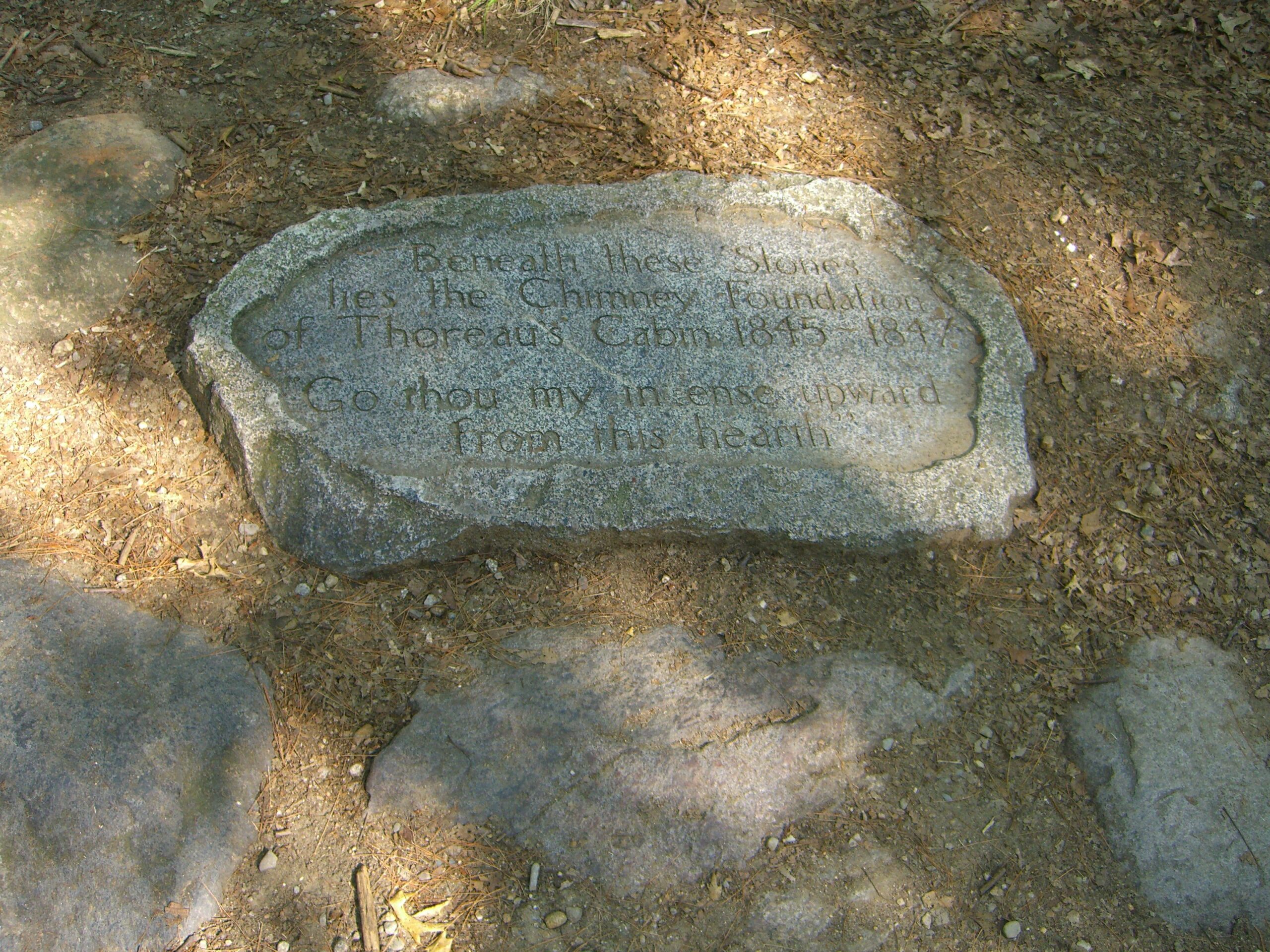
A stone marks the original site of Thoreau’s cabin near Walden Pond.
After the reunion, I drove to Concord, Massachusetts to visit Walden Pond, the famous site at which Thoreau lived for two years while writing Walden. When I arrived, I hiked two miles, past a swimming area and concession stand, through the forest to the original location of Thoreau’s one-room cabin. The site was not deep in an impenetrable wilderness, but nearby a major road just across the pond from a gift shop and swimming tourists. Standing on the forest soil where Thoreau had lived under a canopy of pine trees, I wished the spot were more isolated. Thoreau, too, admitted his frustration with the nearby sounds of the railroad and rumbling carriages that interrupted his life in the otherwise serene forest. I felt some comfort in knowing that even the revered Henry David Thoreau struggled to avoid compromising his ideals. Maybe the best Suzanne and I could hope for was the gray area between passion and practicality.
My wisdom teeth cavities ached as I looked through the trees at the shimmering blue water. “A lake is the landscape’s most beautiful and expressive feature,” Thoreau wrote. “It is Earth’s eye; looking into which the beholder measures the depth of his own nature.”
The eye of Walden Pond looked back at me. I wondered what it saw. I wished it could tell me.
How to Visit Walden Pond and Take a Thoreau-Inspired Trip
After flying into Boston’s Logan International Airport and renting a car, a quick, 40-minute drive to Walden Pond State Reservation in Concord, Massachusetts will put you within hiking distance of the site of Thoreau’s original cabin.
Take I-93 north for about six miles, then follow signs to the Concord Turnpike (MA-2) for about 11 miles going west. In addition to the hike at the park, you can also go swimming in Walden Pond from a beach and see a reconstruction of Thoreau’s cabin, with complete copies of his original furniture and a fireplace.
The Concord Museum, which is just a 5-minute drive north on Walden Street (I am not making this up), houses the cabin’s original furniture if you’re interested in seeing it.
To rent your own cabin in New Hampshire’s White Mountain National Forest as Suzanne and I did, contact A Better Life Cabins & Campgrounds (866-265-3158, $50 per night) for basic cabin rentals. For a more luxurious and charming bed and breakfast experience in the woods, which also puts you within a 30-minute drive of beautiful Dartmouth College (Dr. Seuss’s alma mater), contact The Chase House in Cornish, New Hampshire (603-675-5391, $175 per night).
To rent a canoe in this area for a trip down the Connecticut River to try some loon-watching, contact Dartmouth’s Ledyard Canoe Club (603-643-6709, lcc@dartmouth.edu). As for attending your college reunion, well, good luck.
I love it! Henry David Throeau is the reason my best friend and I are begininng our first real "travels" in life in Spring 2010. Please check out our blog!